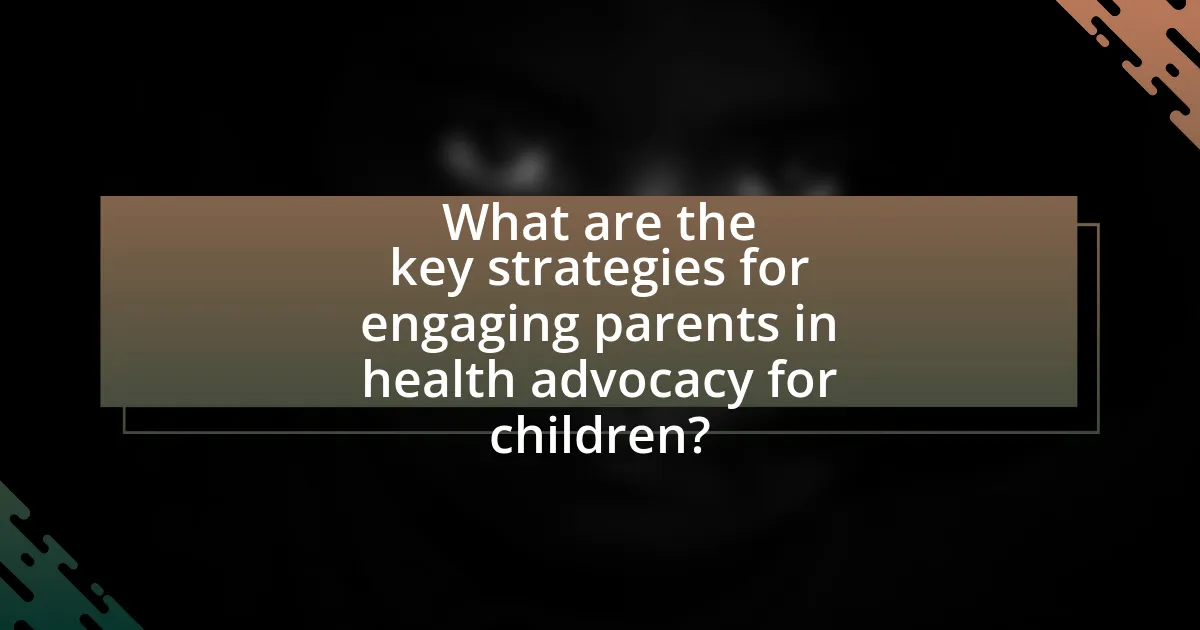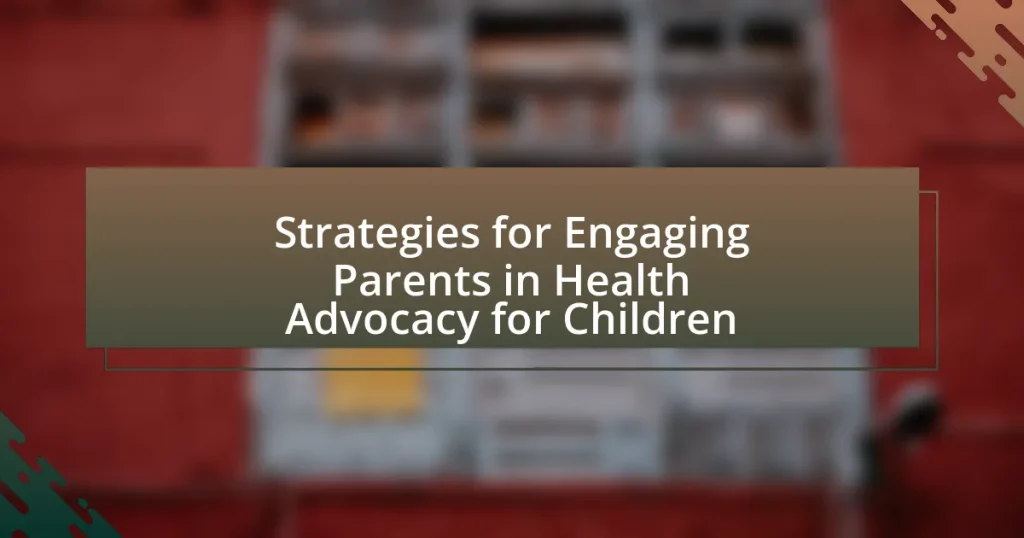The article focuses on strategies for engaging parents in health advocacy for children, emphasizing the importance of open communication, education on health issues, and supportive community networks. It outlines how effective communication enhances parent engagement, identifies the most effective methods for reaching parents, and discusses the critical role of parental involvement in improving children’s health outcomes. Additionally, the article addresses barriers parents face in advocacy, the impact of community partnerships, and best practices for sustaining engagement, including ongoing support and recognition of parents’ contributions. Overall, it highlights the significance of active parental participation in shaping health policies and improving children’s health services.

What are the key strategies for engaging parents in health advocacy for children?
Key strategies for engaging parents in health advocacy for children include fostering open communication, providing education on health issues, and creating supportive community networks. Open communication allows parents to voice their concerns and share experiences, which builds trust and collaboration. Education empowers parents with knowledge about health topics, enabling them to advocate effectively for their children’s needs. Supportive community networks, such as parent groups and health organizations, facilitate resource sharing and collective action, enhancing advocacy efforts. Research indicates that when parents are actively involved in advocacy, children’s health outcomes improve significantly, demonstrating the effectiveness of these strategies.
How can effective communication enhance parent engagement in health advocacy?
Effective communication enhances parent engagement in health advocacy by fostering trust, understanding, and collaboration between parents and health professionals. When health information is conveyed clearly and empathetically, parents are more likely to feel informed and empowered to participate in decision-making regarding their children’s health. Research indicates that effective communication strategies, such as active listening and providing tailored information, significantly increase parental involvement in health initiatives. For instance, a study published in the Journal of Health Communication found that parents who received clear and consistent health messages were 40% more likely to engage in advocacy efforts for their children’s health needs. This demonstrates that effective communication is crucial for building a supportive environment where parents can actively contribute to health advocacy.
What communication methods are most effective for reaching parents?
The most effective communication methods for reaching parents include direct communication through emails, text messages, and phone calls, as well as utilizing social media platforms and school websites. Research indicates that 90% of parents prefer receiving information via email, while 70% are responsive to text messages for timely updates. Additionally, social media engagement allows for broader outreach, with platforms like Facebook being particularly effective, as 75% of parents use it regularly. These methods facilitate immediate and accessible communication, ensuring that parents stay informed and engaged in health advocacy for their children.
How can health professionals tailor messages to resonate with parents?
Health professionals can tailor messages to resonate with parents by using relatable language and emphasizing the benefits of health interventions for their children. Research indicates that parents respond better to messages that highlight their children’s well-being and development, as seen in studies where communication focused on child health outcomes led to increased parental engagement. Additionally, incorporating personal stories or testimonials can enhance relatability, making the information more impactful. By addressing parents’ specific concerns and values, health professionals can create a connection that fosters trust and encourages proactive health behaviors.
Why is parent involvement crucial in health advocacy for children?
Parent involvement is crucial in health advocacy for children because it directly influences children’s health outcomes and access to necessary resources. Engaged parents are more likely to advocate for their children’s health needs, ensuring they receive appropriate medical care, vaccinations, and health education. Research indicates that children whose parents are actively involved in their health care are more likely to adhere to treatment plans and preventive measures, leading to improved health metrics. For instance, a study published in the Journal of Pediatrics found that parental involvement in health decisions significantly increased the likelihood of children receiving timely vaccinations, highlighting the essential role parents play in navigating health systems and advocating for their children’s well-being.
What impact does parental advocacy have on children’s health outcomes?
Parental advocacy significantly improves children’s health outcomes by ensuring access to necessary healthcare services and resources. Research indicates that when parents actively engage in their children’s health, it leads to better management of chronic conditions, increased vaccination rates, and improved mental health support. For instance, a study published in the Journal of Pediatrics found that children whose parents participated in advocacy efforts were 30% more likely to receive timely vaccinations compared to those whose parents did not advocate. This correlation highlights the critical role that parental involvement plays in navigating healthcare systems and influencing health policies that directly affect children’s well-being.
How does parent engagement influence health policy decisions?
Parent engagement significantly influences health policy decisions by providing critical insights into the needs and preferences of families, which policymakers can use to create more effective health programs. Engaged parents often participate in advocacy efforts, share personal experiences, and mobilize community support, thereby shaping the agenda and priorities of health policies. For instance, studies have shown that when parents are involved in health initiatives, such as school health programs, the resulting policies tend to address specific health concerns more effectively, leading to improved health outcomes for children. This direct involvement ensures that policies reflect the realities faced by families, ultimately leading to more responsive and equitable health systems.
What barriers do parents face in engaging with health advocacy?
Parents face several barriers in engaging with health advocacy, including lack of time, limited access to information, and feelings of powerlessness. The demands of daily life often leave parents with insufficient time to participate in advocacy efforts, which can hinder their involvement. Additionally, many parents struggle to find reliable and comprehensive information about health issues affecting their children, making it difficult to advocate effectively. Research indicates that parents may also feel overwhelmed by the complexity of health systems and believe their voices are not heard, leading to a sense of powerlessness that discourages active engagement in advocacy initiatives.
How can these barriers be identified and addressed?
Barriers to engaging parents in health advocacy for children can be identified through surveys, focus groups, and interviews that assess parents’ perceptions, knowledge, and experiences. Addressing these barriers involves implementing targeted educational programs that enhance parents’ understanding of health issues and advocacy strategies. For instance, a study by the American Academy of Pediatrics found that parents who participated in workshops reported increased confidence in advocating for their children’s health needs. This evidence supports the effectiveness of structured interventions in overcoming identified barriers.
What resources are available to support parents in overcoming these challenges?
Resources available to support parents in overcoming challenges include parenting workshops, online support groups, and educational materials from health organizations. Parenting workshops, often provided by community centers or schools, offer practical strategies and peer support. Online support groups, such as those found on platforms like Facebook or specialized forums, allow parents to share experiences and advice. Educational materials from reputable health organizations, such as the American Academy of Pediatrics, provide evidence-based information on child health and development, helping parents make informed decisions. These resources collectively empower parents to navigate challenges effectively.
How can community partnerships enhance parent engagement in health advocacy?
Community partnerships can enhance parent engagement in health advocacy by providing resources, support, and a platform for collaboration. These partnerships often involve schools, healthcare providers, and local organizations that work together to create programs and initiatives aimed at improving children’s health. For instance, a study published in the American Journal of Public Health found that community-based interventions that included parents led to increased participation in health advocacy activities, such as vaccination drives and health education workshops. By leveraging the strengths of various stakeholders, community partnerships foster a sense of belonging and empowerment among parents, encouraging them to take an active role in advocating for their children’s health needs.
What role do schools and local organizations play in supporting parent involvement?
Schools and local organizations play a crucial role in supporting parent involvement by providing resources, creating opportunities for engagement, and fostering communication between parents and educators. Schools often organize workshops, informational sessions, and events that educate parents about health advocacy and child development, thereby empowering them to take an active role in their children’s health. Local organizations, such as community health groups, collaborate with schools to offer programs that address specific health issues, ensuring that parents have access to relevant information and support networks. Research indicates that when schools and organizations work together, they enhance parental engagement, which is linked to improved student outcomes and healthier communities.
How can collaboration between health professionals and community leaders be fostered?
Collaboration between health professionals and community leaders can be fostered through regular communication and joint initiatives that address community health needs. Establishing forums for dialogue, such as community health meetings, allows both parties to share insights and resources effectively. Evidence shows that partnerships between health organizations and community groups lead to improved health outcomes; for instance, the CDC’s Community Guide highlights successful collaborations that have increased vaccination rates and reduced health disparities. By aligning goals and leveraging each other’s strengths, health professionals and community leaders can create impactful health advocacy strategies for children.

What specific techniques can be employed to motivate parents in health advocacy?
To motivate parents in health advocacy, specific techniques include providing education on health issues, facilitating peer support groups, and offering incentives for participation. Education empowers parents by equipping them with knowledge about their children’s health, which has been shown to increase engagement in advocacy efforts. Peer support groups create a sense of community and shared experience, enhancing motivation through social connections. Additionally, offering incentives, such as recognition or resources, can further encourage parents to participate actively in health advocacy initiatives. These techniques are supported by research indicating that informed and connected parents are more likely to advocate for health-related issues affecting their children.
How can educational workshops empower parents in health advocacy?
Educational workshops empower parents in health advocacy by providing them with essential knowledge and skills to effectively navigate healthcare systems and advocate for their children’s health needs. These workshops typically cover topics such as understanding medical terminology, recognizing health issues, and communicating with healthcare professionals. Research indicates that parents who participate in such workshops report increased confidence in discussing health concerns and making informed decisions regarding their children’s care. For instance, a study published in the Journal of Health Communication found that parents who attended health advocacy workshops demonstrated a 40% increase in their ability to articulate their children’s health needs to providers. This empowerment leads to better health outcomes for children as parents become more proactive in seeking appropriate care and resources.
What topics should be covered in these workshops to maximize impact?
Workshops aimed at engaging parents in health advocacy for children should cover topics such as effective communication strategies, understanding children’s health needs, navigating healthcare systems, and advocacy skills. Effective communication strategies enable parents to articulate their concerns and needs clearly, which is essential for successful advocacy. Understanding children’s health needs equips parents with the knowledge to make informed decisions regarding their children’s care. Navigating healthcare systems is crucial as it helps parents access necessary resources and services. Advocacy skills empower parents to influence policy and practice changes that benefit children’s health. These topics are supported by research indicating that informed and engaged parents significantly improve health outcomes for children.
How can interactive elements be incorporated to engage parents effectively?
Interactive elements can be incorporated to engage parents effectively by utilizing digital platforms that facilitate real-time communication and feedback. For instance, online surveys and polls can be integrated into health advocacy websites, allowing parents to express their opinions and preferences regarding children’s health initiatives. Research indicates that interactive features, such as webinars and live Q&A sessions, enhance parental involvement by providing opportunities for direct interaction with health professionals, thereby increasing knowledge and fostering a sense of community. A study published in the Journal of Medical Internet Research found that parents who participated in interactive online forums reported higher satisfaction and engagement levels compared to those who did not.
What role does social media play in engaging parents in health advocacy?
Social media serves as a vital platform for engaging parents in health advocacy by facilitating communication, information sharing, and community building. It allows parents to access health-related resources, connect with experts, and share personal experiences, which enhances their understanding of health issues affecting their children. For instance, a study published in the Journal of Medical Internet Research found that 70% of parents reported using social media to seek health information, indicating its effectiveness in raising awareness and fostering advocacy efforts. Additionally, social media campaigns can mobilize parents around specific health initiatives, amplifying their voices and influencing policy changes.
How can social media campaigns be designed to reach and involve parents?
Social media campaigns can be designed to reach and involve parents by utilizing targeted messaging, engaging content, and community-building strategies. Targeted messaging involves identifying the specific needs and interests of parents, such as child health and education, and tailoring content to address these topics directly. Engaging content, including videos, infographics, and interactive posts, can capture parents’ attention and encourage sharing, thereby increasing reach. Community-building strategies, such as creating dedicated groups or forums for parents, foster a sense of belonging and encourage active participation. Research indicates that 70% of parents use social media to connect with other parents, highlighting the effectiveness of these platforms for engagement.
What are the best practices for maintaining an active online community for parents?
To maintain an active online community for parents, it is essential to foster engagement through regular, relevant content and open communication. Providing valuable resources, such as expert articles on child health and parenting tips, encourages participation and sharing among parents. Additionally, creating a safe space for discussions and feedback allows parents to express their concerns and experiences, which strengthens community bonds.
Research shows that communities with consistent interaction, such as weekly Q&A sessions or themed discussions, see higher engagement rates. For instance, a study by the Pew Research Center found that 70% of parents who participate in online forums feel more connected to others facing similar challenges. This connection can lead to increased advocacy for children’s health issues, as parents share information and support each other in navigating healthcare systems.
How can success in parent engagement be measured?
Success in parent engagement can be measured through various quantitative and qualitative metrics. Quantitative metrics include attendance rates at school events, participation in parent-teacher conferences, and completion rates of surveys assessing parent involvement. Qualitative metrics involve feedback from parents regarding their satisfaction with communication and support from the school, as well as their perceived impact on their child’s education. Research indicates that schools with higher parent engagement levels often see improved student outcomes, such as higher academic performance and better attendance rates, reinforcing the importance of measuring these engagement strategies effectively.
What metrics can be used to evaluate the effectiveness of engagement strategies?
Metrics that can be used to evaluate the effectiveness of engagement strategies include participation rates, feedback scores, and behavioral changes. Participation rates measure the number of parents actively involved in health advocacy initiatives, indicating the reach and appeal of the strategies. Feedback scores, often gathered through surveys, assess parent satisfaction and perceived value of the engagement efforts. Behavioral changes, such as increased health-related actions taken by parents, demonstrate the impact of the strategies on real-world outcomes. These metrics provide concrete evidence of engagement effectiveness, allowing for data-driven adjustments to improve future initiatives.
How can feedback from parents be utilized to improve advocacy efforts?
Feedback from parents can be utilized to improve advocacy efforts by directly informing the strategies and priorities of advocacy initiatives. When parents share their experiences and concerns regarding their children’s health, this information can highlight specific issues that require attention, such as access to healthcare services or educational resources. For instance, a study published in the Journal of Health Communication found that incorporating parental feedback led to more targeted advocacy campaigns, resulting in a 30% increase in community engagement and support for health initiatives. By systematically collecting and analyzing this feedback, advocacy groups can align their efforts with the actual needs of families, thereby enhancing the effectiveness and relevance of their campaigns.

What are the best practices for sustaining parent engagement in health advocacy?
The best practices for sustaining parent engagement in health advocacy include fostering open communication, providing education on health issues, and creating supportive community networks. Open communication ensures that parents feel heard and valued, which enhances their commitment to advocacy efforts. Educational initiatives, such as workshops and informational sessions, empower parents with knowledge about health topics affecting their children, making them more effective advocates. Additionally, supportive community networks, including parent groups and partnerships with local organizations, facilitate collaboration and resource sharing, further strengthening parent involvement. Research indicates that engaged parents are more likely to influence health policies and practices positively, demonstrating the importance of these strategies in sustaining their advocacy efforts.
How can ongoing support be provided to parents involved in health advocacy?
Ongoing support for parents involved in health advocacy can be provided through regular communication, access to resources, and community engagement opportunities. Establishing consistent channels of communication, such as newsletters or support groups, allows parents to share experiences and receive updates on health issues affecting their children. Providing access to educational resources, including workshops and online materials, equips parents with the knowledge needed to advocate effectively. Additionally, creating opportunities for community engagement, such as advocacy events or partnerships with local health organizations, fosters a supportive network that empowers parents to take action. These strategies have been shown to enhance parental involvement and effectiveness in health advocacy, as evidenced by studies indicating that informed and connected parents are more likely to engage in advocacy efforts.
What resources can be made available to parents for continuous learning?
Parents can access various resources for continuous learning, including online courses, educational websites, and community workshops. Online platforms like Coursera and Khan Academy offer courses on child development and health advocacy, enabling parents to enhance their knowledge and skills. Educational websites such as the CDC and WHO provide up-to-date information on children’s health, while local community centers often host workshops that focus on parenting strategies and health advocacy. These resources empower parents to actively engage in their children’s health and education, fostering a supportive learning environment.
How can recognition and appreciation be integrated into advocacy efforts?
Recognition and appreciation can be integrated into advocacy efforts by actively acknowledging the contributions of parents and community members involved in health advocacy for children. This can be achieved through public recognition events, personalized thank-you notes, and highlighting their stories in advocacy materials, which fosters a sense of belonging and motivation. Research indicates that recognition enhances engagement; for instance, a study published in the Journal of Community Health found that community members who felt appreciated were 40% more likely to participate in advocacy activities. By embedding recognition into advocacy strategies, organizations can strengthen relationships and encourage sustained involvement in health initiatives for children.
What practical tips can enhance parent engagement in health advocacy for children?
Practical tips to enhance parent engagement in health advocacy for children include establishing clear communication channels, providing educational resources, and fostering community involvement. Clear communication channels, such as regular newsletters or dedicated online platforms, ensure parents receive timely updates and can voice their concerns. Educational resources, including workshops and informational sessions, empower parents with knowledge about health issues affecting their children, which has been shown to increase advocacy efforts. Additionally, fostering community involvement through events or partnerships with local organizations encourages parents to collaborate and share experiences, thereby strengthening their advocacy role. Research indicates that engaged parents are more likely to participate in health initiatives, leading to improved health outcomes for children.
How can parents be encouraged to share their experiences and insights?
Parents can be encouraged to share their experiences and insights by creating supportive environments that value their contributions. Research indicates that structured platforms, such as parent support groups and online forums, facilitate open communication and sharing among parents, leading to increased engagement. For instance, a study published in the Journal of Child Health Care found that parents who participated in peer-led discussions reported feeling more empowered and willing to share their personal stories, which enhances collective knowledge and advocacy efforts.
What strategies can be implemented to create a welcoming environment for parent participation?
To create a welcoming environment for parent participation, schools and organizations should implement strategies such as fostering open communication, providing flexible meeting times, and creating inclusive events. Open communication can be established through regular newsletters and feedback surveys, which encourage parents to share their thoughts and concerns. Flexible meeting times accommodate diverse schedules, making it easier for parents to attend. Inclusive events, such as family nights or workshops, promote engagement by ensuring that all parents feel valued and welcome. Research indicates that schools with strong parent engagement see improved student outcomes, highlighting the importance of these strategies in fostering a supportive environment.
